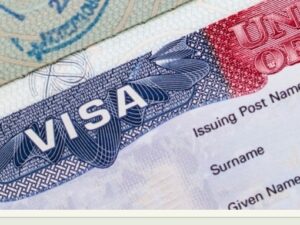Why the U.S. Revised Its Visa Policies for Nigerian Applicants
Why the U.S. Revised Its Visa Policies for Nigerian Applicants

By Claire Mom

On Tuesday, the U.S. Embassy in Nigeria announced significant changes to visa issuance for Nigerian nationals. Most non-diplomatic and non-immigrant visas will now be limited to single entry with a validity period of just three months. This marks a sharp departure from the previous system, which allowed many Nigerians to enjoy multiple-entry visas with longer durations and greater flexibility.
This update, which took effect on July 8, has sparked widespread discussion online and among those who frequently travel to the United States.
So, what led to this change, why now, and what does it mean for Nigerians planning visits to the U.S.? Here’s a breakdown of the key points.
—
Understanding Non-Immigrant Visas
Non-immigrant visas are designed for individuals visiting the U.S. temporarily, whether for tourism, business, education, medical care, temporary employment, or cultural exchange. These visas do not permit permanent residency but allow stays that correspond to the specific purpose of the visit.
Some common types include:
B visas: For tourists (B-2) and business travelers (B-1)
F and M visas: For academic and vocational students
H visas: For temporary workers, such as H-1B for specialty jobs
J visas: For exchange visitors
O visas: For individuals with extraordinary skills
P visas: For athletes, artists, and entertainers
Others include religious workers (R), treaty traders/investors (E), and trafficking victims (T).
Non-diplomatic visas encompass all these categories except those reserved for diplomats and government officials, who receive diplomatic (A) visas.
—
Who Is Impacted?
The embassy noted that these changes will primarily affect “most non-immigrant and non-diplomatic visas.” This means students, tourists, and frequent business visitors—who often rely on longer stays or multiple entries—will feel the biggest impact.
—
What Were the Rules Before?
Previously, Nigerians could obtain multiple-entry visas for periods extending up to five years, particularly for tourism and business purposes. Student visas generally covered the full term of their academic programs with options to extend, and exchange visitor visas often allowed multiple entries, depending on the specific program.
—
Why Did This Happen?
The U.S. State Department introduced these changes as part of an update to its reciprocal visa policy. Reciprocity means that visa rules between countries should reflect mutual treatment—if one country imposes certain restrictions, the other mirrors those conditions to maintain fairness.
This policy is regularly reviewed, allowing the U.S. to adjust visa validity periods and entry allowances based on how foreign governments treat U.S. citizens.
In June, Nigeria was included among 36 nations facing new travel restrictions or visa conditions. These countries were given 60 days to comply with updated requirements, though the full details were not made public.
The U.S. Embassy stated Nigeria still needs to fulfill key criteria, such as issuing secure travel documents with verifiable identity features, better managing visa overstays, and sharing pertinent security and criminal information with U.S. authorities.
—
Did Nigeria Restrict Visas for U.S. Citizens?
No. Nigeria launched an e-visa system on March 1 that enables tourists, business travelers, and investors from outside ECOWAS to apply online, avoiding in-person visits to embassies. This e-visa grants single-entry permits valid for 90 days, with a maximum stay of 30 days.
Physical embassy-issued visas for U.S. citizens remain unchanged, with validity ranging from three months to five years and options for single or multiple entries depending on the visa type.
—
Nigeria’s Official Response
Kimiebi Ebienfa, spokesperson for Nigeria’s Ministry of Foreign Affairs, expressed disappointment with the U.S. decision. In a statement released Wednesday, Ebienfa said the new restrictions undermine the principles of reciprocity, fairness, and mutual respect that should underpin diplomatic relations.
The ministry urged the U.S. to reconsider the policy, emphasizing the importance of partnership and cooperation between the two nations.
TRENDING SONGS
 NPMA Appeals to Nigerian Government for Compensation After Lagos Market Fire
NPMA Appeals to Nigerian Government for Compensation After Lagos Market Fire
 Rest Every Four Hours, FRSC Issues Safety Guide for Fasting Motorists
Rest Every Four Hours, FRSC Issues Safety Guide for Fasting Motorists
 NNPC Boss Ojulari Bags UK Energy Institute Fellowship
NNPC Boss Ojulari Bags UK Energy Institute Fellowship
 Shock in Anambra: Bride Disappears Moments Before Wedding
Shock in Anambra: Bride Disappears Moments Before Wedding
 Nigerian Woman Returns ₦330 Million Accidentally Credited to Her Account
Nigerian Woman Returns ₦330 Million Accidentally Credited to Her Account
 APC Don Reach Morocco?’ VeryDarkMan Reacts to Seyi Tinubu Poster
APC Don Reach Morocco?’ VeryDarkMan Reacts to Seyi Tinubu Poster
 Bride Breaks Down in Tears as Wedding Meals Were Kept Secretly While Guests Go Home Hungry
Bride Breaks Down in Tears as Wedding Meals Were Kept Secretly While Guests Go Home Hungry
 Odogwu by Day, Robber by Night: How Marriage Joy Turned Into Tragedy
Odogwu by Day, Robber by Night: How Marriage Joy Turned Into Tragedy
 Nigerian Officials Allegedly Pocket N4–6B Weekly Through Smuggling Cartels at Seme–Badagry Border
Nigerian Officials Allegedly Pocket N4–6B Weekly Through Smuggling Cartels at Seme–Badagry Border
 Ahmad Yerima: Naval Officer to Face No Sanctions After Clash with Wike – Matawalle
Ahmad Yerima: Naval Officer to Face No Sanctions After Clash with Wike – Matawalle
Share this post with your friends on ![]()













